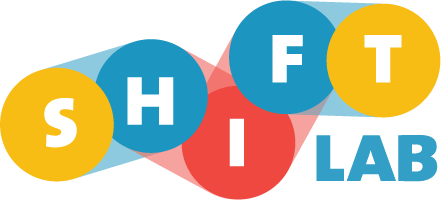SHIFT LAB 2.0 COLLECTIVE
Shift Lab 2.0 (2017-2020).
Understanding the value of grassroots approaches to social change, shift lab stewards laid the foundation for growing the three key groups involved in Shift Lab 2.0
COMMUNITY VOICE AND CONTEXT EXPERTS
This was an ever growing collective of organizations and people with lived experience that were interested in or already working on addressing racism Edmonton. This group acted as a bridge connecting community experiences to the lab process. People and organizations were well compensated for their time, and expertise when engaged in interviews, and workshops.
LAB BACKBONE STEWARDSHIP
A group of 5 people that represent diverse ethnocultural community perspectives and have knowledge and know-how around the stewardship of social innovation and change lab processes. This group stewarded the process design of the lab, curated research and gathered stories and other data to ensure the lab was rooted in sound principles, and coordinated well. They also co-facilitate lab workshops and wrote the bulk of the learning reports.
CORE LAB TEAM
This was the heart of the lab. These were a diverse group of people in 4 teams with backgrounds in human rights activism, lived experience, design thinking, systems thinking, anthropology, service innovation, community building and human services. This team engaged in on the ground research with community to explore assumptions, ideas, and realities of racism in Edmonton. After their research, they ideated possible solutions and then tested the proposed solutions to ensure assumptions were kept in check.
WHAT IS A SOCIAL INNOVATION LAB?
To aid the move from roundtable talks to action, a promising approach has emerged in the social innovation ecosystem. Often called a social innovation lab, the approach draws on the strengths, empathy, creativity, and wisdom of a collective to explore new ways of making progress on a complex challenge. These labs are guided by convening diverse perspectives on an issue, gaining insight from people with lived experience of a challenge, facilitated ideation, building prototypes of solutions, and testing them to see how they work on the ground with people. A lab creates a safe zone for a collective to explore, question assumptions, be bold, be agile enough to adapt as learning emerges and experiment with solutions. As evidence emerges of what prototyped solutions are working, solutions can be scaled and spread to impact systemic change. To help scale solutions systemically, key champions are needed who can open doors, steward policy shifts and build capacity for embracing change.
A LAB EXPLORATION IS
ABOUT THE JOURNEY
AND THE GOAL
Edmonton Shift Lab 2.0 was about exploring and proposing interventions to address racism at systemic and on the ground levels. While the aim was to develop innovative prototypes to help address the issues and needs of our communities, the journey towards this goal was equally important. The collective learning that emerged and continues to develop from the lab was a vital part of the process. As we moved forward together in Shift Lab 2.0, we were diligent about documenting the learning of what was working and what wasn’t so that the journey was as transparent as possible and designed to build and share knowledge for future anti-racism and change making efforts.
The work of Shift Lab 1.0 and 2.0 has been shared internationally as an exemplary social innovation lab that centered indigenous knowledge well and co-created with a diverse collective promising interventions that continue to scale.
“A two way process to learn about each other’s culture,
‘interculturalism’, will lead to stronger sharing.”
COMMUNITY VOICE
An ever growing collective of organizations and people with lived experience that are interested in or already working on addressing racism and poverty in Edmonton. This group acts as a bridge connecting community experiences to the lab process. People and organizations are compensated for their time, and expertise when engaged in interviews, and workshops.
“The words “If people would just…” are never a part of an effective social innovation. If your goal is to create social change, strong arguments will rarely suffice. You must also understand people’s behaviour and design solutions that disrupt habits.”
“Ending racism means making ‘the other’ less intimidating – having fun, sharing culture and stories. Why do we always make it boring and dull? It should be about empowering, joy and celebration.”
“Racism and stereotypes are major issues. People have stereotypes about me too, as a new Iraq Canadian.”
PARTNERS
RESEARCHERS DURING THE DISCOVERY PHASE OF SHIFT LAB 2.0
Behaviour Change Researcher- Galdys Rowe
Indigenous Epistemology Researchers – Jacqueline and Hunter Cardinal, Jodi Stonehouse
Racism and Anti-Racist Practice Researchers – Centre for Race and Culture Edmonton
INDIGENOUS ADVISORY
Toni Letendre
Johnny Lee
Toni’s family
Jacqueline and Hunter Cardinal
Littlechild family
Diane Roussin and Winnipeg Boldness
SPEAKER SERIES INFLUENCERS
Shelly Tochluk
Daryl Davis
Trevor Phillips
LAB PROCESS INSPIRATION
Sam Rye
Cheryl Rose
Frances Westley
Diane Roussin
Mark Cabaj
George Aye
Melanie Goodchild and Turtle Island Institute
Converge Conference SFU participants
Spark Conference participants
LABWise participants
Angela Pugh
Gina Rembe
Joshua Cubista
Lauren Morgan
Mark Holmgren
Nathan Heintz
David Prodan
Zaid Hassan
Mark Cabaj
COMMUNITY SUPPORTERS AND INFLUENCERS
David Eggen (Minister of Education)
Wendy Boje (Assistant Deputy Minister, Anti-Racism Secretariat)
Jeff Samsanow (Edmonton Quotient)
Hunter Cardinal (Naheyowin)
Renee Iverson (Homeward Trust)
Roya Damabi (CoLab)
Sharon Matthias (Matthias Inc.)
Courtney Schulze (ActiveCare)
Karen Korchinski (AB Dept. Justice and Solicitor General)
Darcy McDonald (Government of Alberta)
Sahana Parameswara (Gateway Association)
Leo Wong (Roundhouse)
Naomi Mahaffy (ABSI Connect)


































